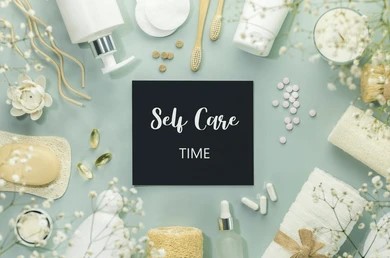
Why is Self-Care Essential for Beauty, Wellness, and Stress-Free Living?
Beauty isn’t just about the products you use – it’s also about how you take care of yourself mentally and emotionally. Incorporating self-care rituals, such as meditation, yoga, and journaling, can reduce stress, improve mental clarity, and promote overall wellness. Stress can show up on your skin as acne, irritation, or puffiness, so taking care of your mind and body is just as important as your skincare routine.
1. Introduction: Why Self-Care Matters
- Discuss how self-care is not selfish but essential for physical, mental, and emotional health.
- Highlight the benefits of regular wellness practices, such as improved focus, reduced stress, and enhanced overall quality of life.
2. Understanding Self-Care
- Define self-care as activities that nurture your mind, body, and spirit.
- Differentiate between superficial self-care (e.g., indulgences) and deep self-care (e.g., setting boundaries, therapy, or healthy habits).
3. Common Barriers to Self-Care
- Explore challenges such as lack of time, guilt, or not knowing where to start.
- Provide strategies to overcome these barriers, like scheduling self-care as non-negotiable appointments.
4. Types of Self-Care
- Physical Wellness: Exercise, balanced nutrition, adequate sleep, and body care routines.
- Mental Wellness: Mindfulness, journaling, therapy, and learning something new.
- Emotional Wellness: Building meaningful connections, setting boundaries, and practicing gratitude.
- Social and Spiritual Wellness: Engaging in community activities, pursuing hobbies, or meditation.
5. Creating a Self-Care Plan
- Share practical steps to build a personalized self-care routine:
- Start small, like a 10-minute meditation or a short walk.
- Identify activities that resonate with you and align with your lifestyle.
- Incorporate variety to address different aspects of wellness.
6. Incorporating Self-Care into a Busy Schedule
- Tips for working professionals or parents, such as time-blocking, multitasking (e.g., listening to an audiobook during chores), or saying “no” to unnecessary commitments.
- Suggest using apps or planners for mindfulness reminders.
7. Self-Care on a Budget
- Highlight cost-effective options like at-home workouts, free meditation apps, DIY spa days, or nature walks.
8. Sustainability and Self-Care
- Encourage regular reflection to adjust self-care routines as your needs evolve.
- Promote self-compassion for days when plans don't go perfectly.
9. Inspirational Stories or Quotes
- Share real-life examples or motivational sayings to inspire readers to take actionable steps toward self-care.
10. Conclusion
- Reinforce the message that self-care is an ongoing process.
- Encourage readers to make wellness a lifelong priority.